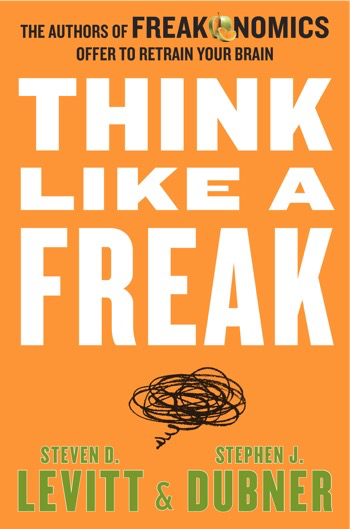 Think Like a Freak is the third and most recent quasi-installation of the Freakonomics series by Steven Levitt and Steven Dubner. Without mincing words, it was great. A page turner, by virtue of Levitt & Dubner’s skill at perspsective shifting, and their ability to find a good story to tell to explain it. It’s also fresh content, with some only referential returns to older material from their previous books.
Think Like a Freak is the third and most recent quasi-installation of the Freakonomics series by Steven Levitt and Steven Dubner. Without mincing words, it was great. A page turner, by virtue of Levitt & Dubner’s skill at perspsective shifting, and their ability to find a good story to tell to explain it. It’s also fresh content, with some only referential returns to older material from their previous books.
The previous installations of Freakonomics were, inadequately summarized, about the difference between causation and correlation. They were a collection of stories which would serve the purpose of showing an alternative perspective on some set of data, which appears to be showing one thing, but is really probably showing something else. They were about as thrilling to read as one could ask for from a book about social economics, which is to say, apparently quite thrilling.
Think Like a Freak takes a detour from the usual style and instead attempts to play into the idea of giving fish, versus teaching to fish. With so many questions from readers, the authors say, they decided it would be better to write a book about the mindset they bring to answering tough questions, rather than answering the questions themselves. It works, well kind of. Let me explain.
In the first chapter, the authors discuss soccer statistics. They say that based on the statistics of where and when a the keeper (the goalie) leaps to stop a ball, the very best place to kick the ball would be straight into the center. Of course, kickers don’t usually do that, perhaps because they don’t know that their statistically more likely to score if they do, but for other reasons too, like the massive embarrassment they’d feel if the keeper didn’t jump out of the way. In short, this is what they mean when they say “think like a freak”. Rational analysis, over sacred cows.
All of this revolves loosely, and sometimes tightly, around the idea that incentives make the world go round. No, not incentives like “buy one get one free”, though that would technically count. More like how our privatizing prisons create incentives for businesses to fight for tougher punishments. They’re incentives about power, well being, money, fear, hope—the human stuff. Understanding the incentives in any situation, as the authors say, is the key to understanding the real problem or challenge. While ordinary people have a strong confirmation bias—they go looking for information that confirms what they already believe, rather than new information that could challenge it—“Freaks” want to disrupt their beliefs. Believing an incentive works is different from observing data that explains how an incentive works (or doesn’t work).
It’s said that asking the right question is half the battle, and understanding the incentives helps you discover the right question.
What happened with the previous two books was that they surprised a lot of people with what they said. Who would think that the plummeting crime rate in the 80’s and 90’s fit exactly with the would-be coming of age of a lot of children who weren’t born because of Roe v. Wade? Not too many. So this book extends out and tries to say “you can think boldly and critically, too!”.
Ultimately though, the book is inspiration and, like the others, has a lot of great moments that make you say “huh…”. But with a subheading like “The authors of Freakonomics offer to retrain your brain”, I’d expected to walk away with something even marginally actionable. Unfortunately, that’s just not the case. But it’s also okay. The book goes through pains to explain that coming up with results is hard to do. That might be the point, here. Someone who wants to “think like a freak”, really, is going to have to devote themselves to it and to do that, they’ll need a considerable boost in inspiration. A boost that Think Like a Freak might just offer some folks.
It was an easy read and I’m a proponent of trying on new perspectives regularly. So I think this is something almost everyone will enjoy—if they can keep from getting mad at the data. And hopefully, some small subset of people will manage to actually follow in Levitt & Dubner’s footsteps and carry on the fight against irrationally held ideologies.

Recent Discussion